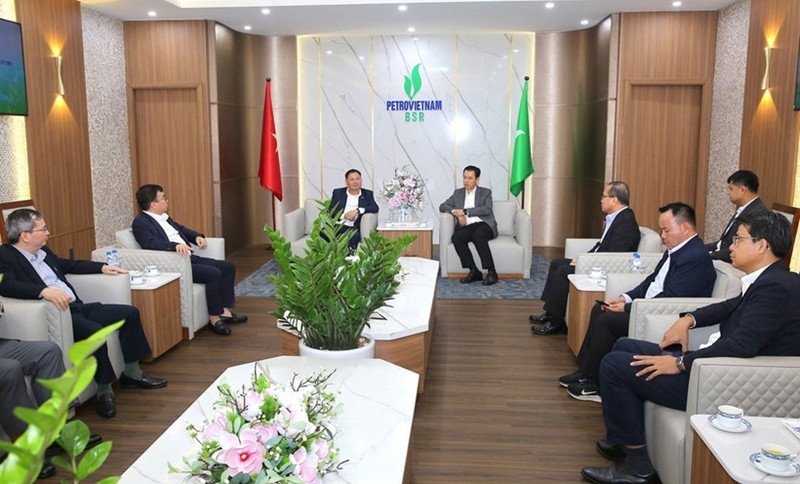Lao Minister of Industry and Commerce Malaithong Kommasith witnessed the signing of the MoU and held a working session with representatives from BSR recently.
At the event, Chairman of the BSR Board of Directors Bui Ngoc Duong said his firm sees significant opportunities and large room for development in the Lao market, adding that with its strengths in producing key refined petroleum products, BSR hopes the Lao Ministry of Industry and Commerce will have special mechanisms to make it easier for the business to promote exports to Laos.
    |
 |
|
BSR leaders receive Lao Ministry of Industry and Commerce. |
BSR is accelerating its shift toward green production, he revealed, saying that Laos could supply cassava chips to the Dung Quat ethanol plant of BSR for producing E100 bioethanol, used in blending RON95 E10 gasoline, one of BSR’s concrete steps toward environmentally friendly fuel production.
The two sides could also set up a partnership in forestry for carbon credit exchanges, as well as in exploiting mineral resources to support the development of new energy and high-value petrochemical products in the future, he added.
Duong affirmed that with the capacity of the Dung Quat Oil Refinery, BSR can fully meet the demand for high-quality petroleum products in the Lao market, contributing to strengthening Vietnam - Laos energy cooperation amid the region’s deeper integration.
For his part, Kommasith highly valued BSR’s production capacity and reputation, emphasizing that the signing of the MoU marks an important first step toward developing a stable and sustainable petroleum market, bringing tangible benefits to both sides.
The Lao ministry will consider supporting BSR in expanding exports of petroleum products, including diesel, RON95 and RON92 gasoline, Jet A-1, and others, to Laos. It would also review special import procedures to facilitate smooth, fast, and efficient customs clearance, he said.
According to the Lao official, his country’s annual fuel demand is around 1.8-2 million tons, and it needs a stable supply at competitive prices.
Lao authorities will review BSR’s proposals on green materials, minerals, and fuel logistics costs, while BSR plans to organize a delegation to Laos to explore market and transport opportunities for deeper cooperation between BSR and Somvanchaleun Petroleum Jelly in particular, as well as companies operating in oil and gas, and minerals in Laos in general.
Currently, Laos imports 100% of its fuel demands, with about 90% supplied by Thailand and 10% from Vietnam and other sources. Expanding cooperation between BSR and Lao partners not only holds economic significance but also supports Laos’ energy and socio-economic security. The two sides aim to raise Vietnam’s fuel supply share to at least 30%, thus promoting bilateral cooperation and creating sustainable development opportunities for both nations.
As part of its business development strategy, BSR is expanding trade cooperation, signing long-term export contracts with partners in Southeast Asia, with a focus on supplying products to Laos, Cambodia, Myanmar, Indonesia, and new markets in East Asia.
Source: VNA